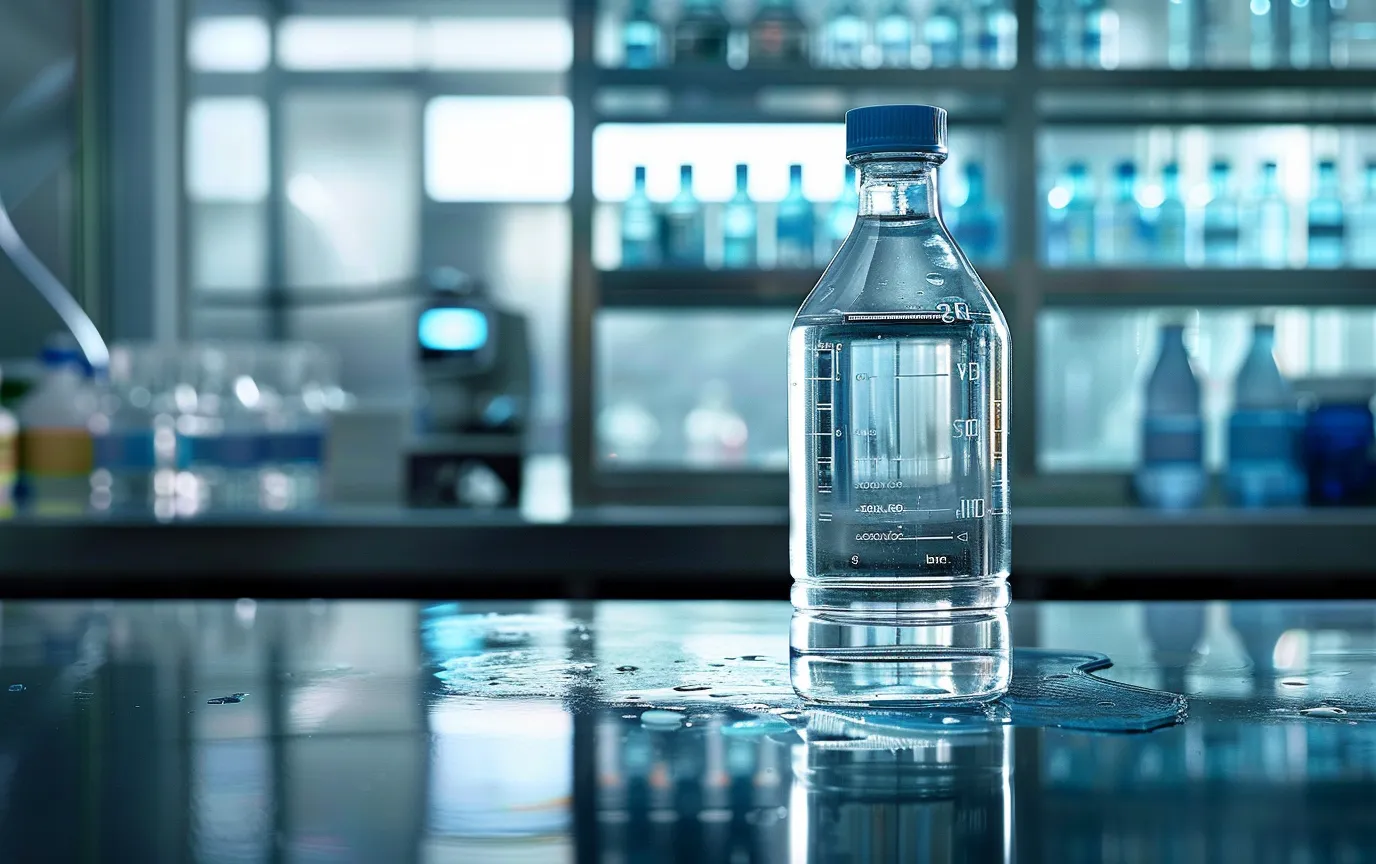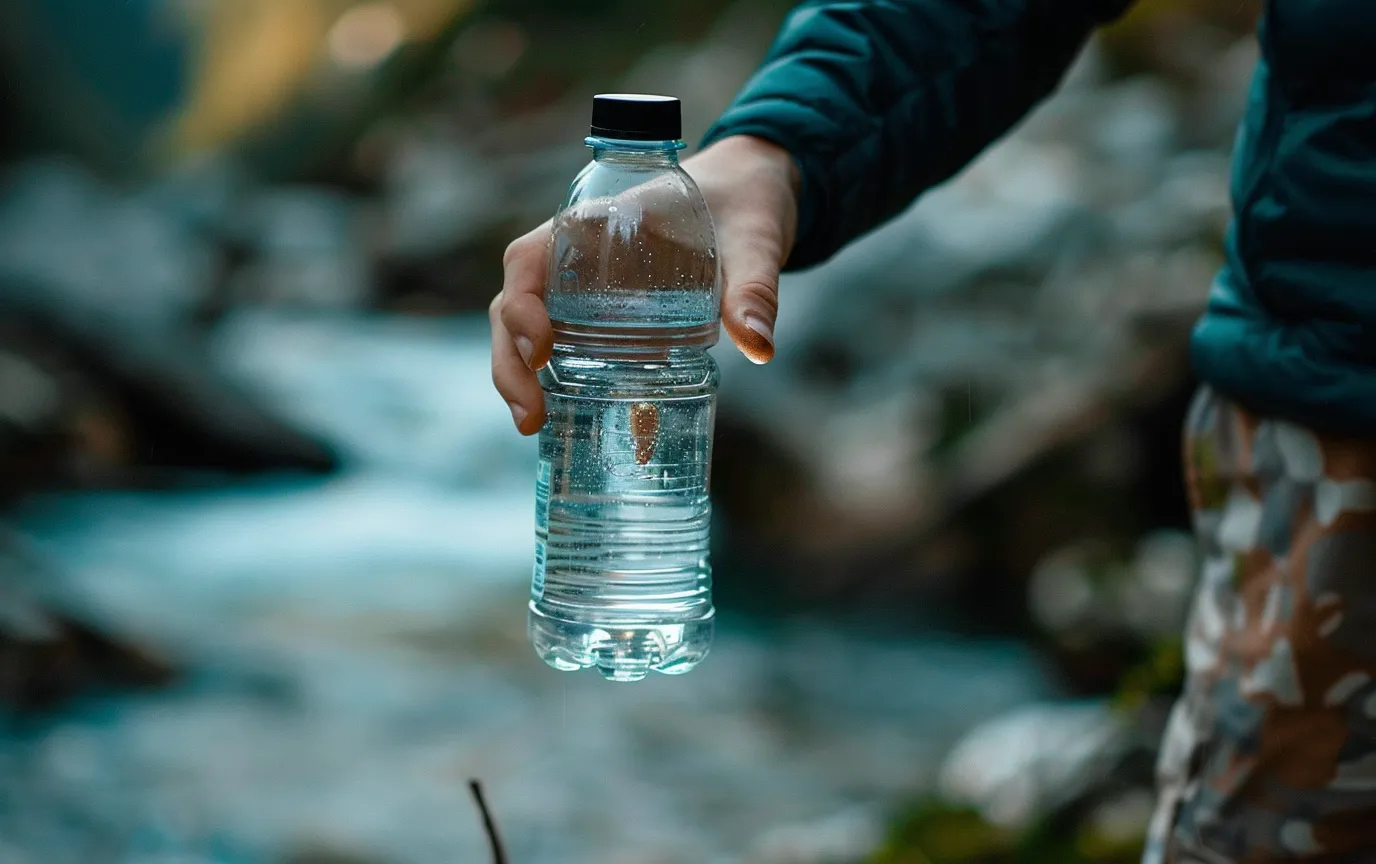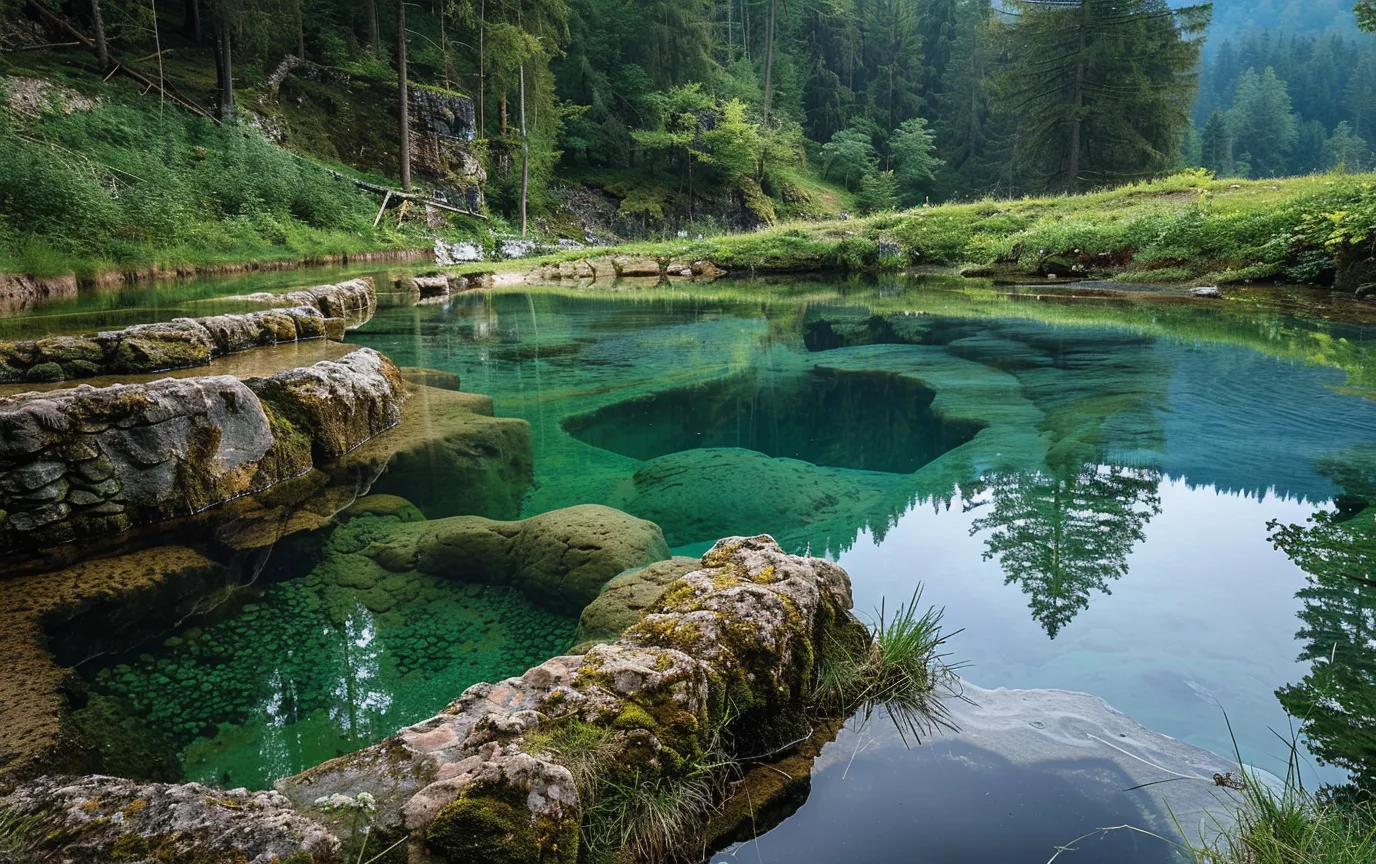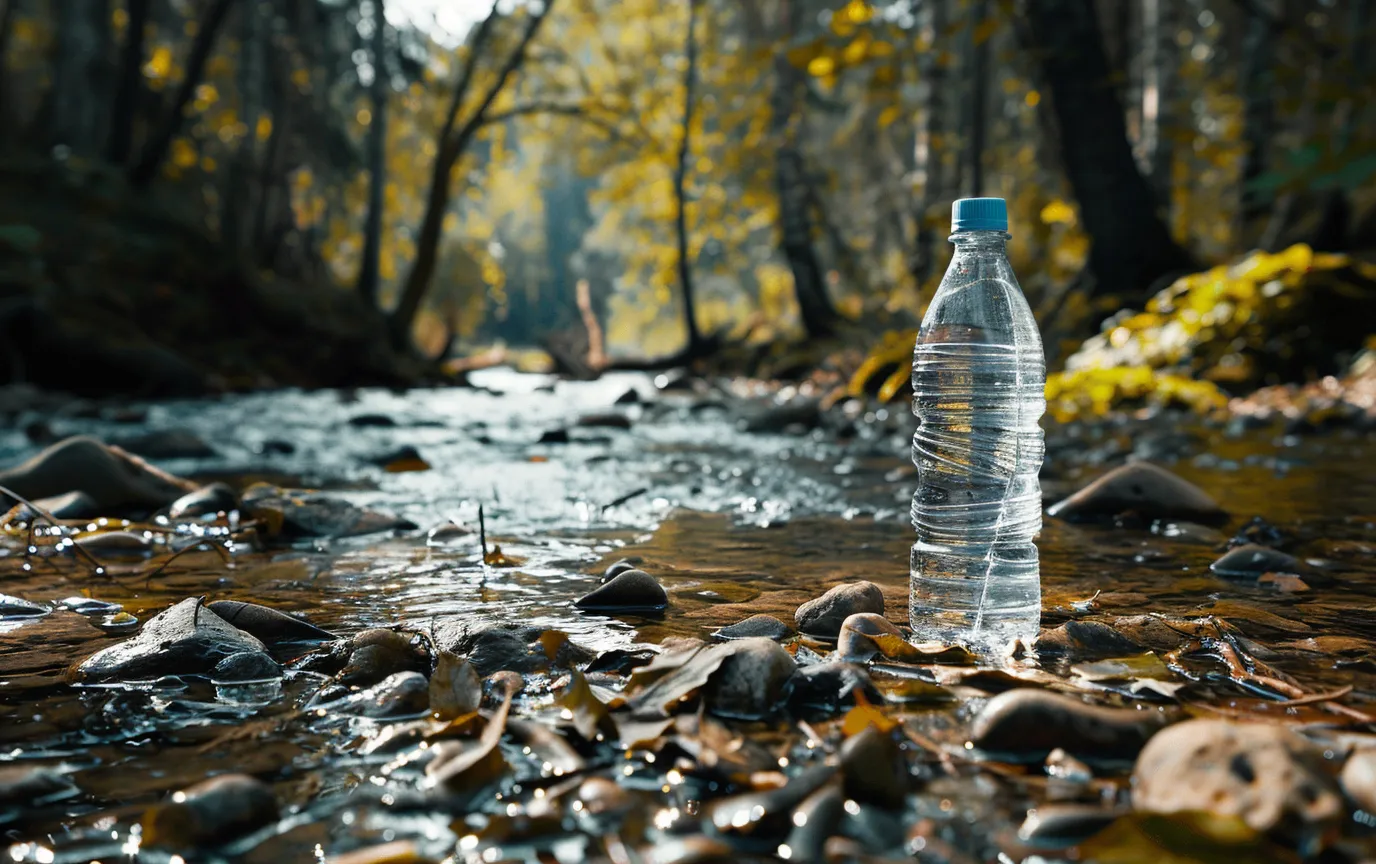

Alkaline mineral water has gained immense popularity in recent years, with many health-conscious consumers in Ukraine, Russia, and Kazakhstan turning to this unique beverage.
But what exactly is it, and is it really as beneficial as claimed? Let’s dive into the world of alkaline mineral water and separate fact from fiction.
What is Alkaline Mineral Water?
Alkaline mineral water is a type of water that has a higher pH level than regular drinking water, typically above 7.5.
This increased alkalinity is due to the presence of naturally occurring minerals like calcium, magnesium, and bicarbonates. Unlike regular water, which is neutral (pH 7), alkaline mineral water is slightly basic or alkaline.
The pH (potential of hydrogen) scale ranges from 0 to 14, with 7 being neutral. Anything below 7 is considered acidic, while anything above 7 is alkaline.
Most bottled alkaline mineral waters have a pH between 8 and 9.

The Controversial Nature of Alkaline Water
While proponents claim numerous health benefits, from improved hydration to cancer prevention, the scientific community remains divided on the actual merits of alkaline mineral water.
Some studies suggest potential benefits, while others dismiss the claims as mere marketing hype.
This controversy has made alkaline mineral water a topic of great interest, especially for health-conscious individuals in Ukraine, Russia, and Kazakhstan, where the consumption of mineral waters has a long-standing tradition.
A Rich History and Cultural Significance of Alkaline Mineral Water
The discovery of mineral springs in the region dates back centuries, with many of these natural sources being revered for their purported healing properties.
In the Soviet era, the use of mineral waters for therapeutic purposes was widespread, with sanatoriums and health resorts dotting the landscape.

Legendary Mineral Springs
- Borjomi (Georgia): One of the most famous mineral water sources in the former Soviet Union, known for its unique mineral composition and slightly alkaline nature.
- Narzan (Russia): This legendary spring in the Caucasus Mountains has been a popular destination for those seeking the healing powers of mineral water.
- Essentuki (Russia): A group of mineral springs in the Stavropol region, renowned for their diverse mineral compositions and therapeutic applications.
As bottled water gained popularity, these natural mineral sources became the foundation for many commercial alkaline mineral water brands.
Popular Alkaline Mineral Water Brands
Today, consumers in Ukraine, Russia, and Kazakhstan have a wide range of alkaline mineral water brands to choose from, each with its unique mineral composition and purported health benefits.

Ukraine
- Morshinska: One of the most popular mineral waters in Ukraine, sourced from the town of Morshin in the Lviv region. Rich in minerals like magnesium and potassium, it is believed to aid digestion and kidney function.
- Myrhorodska: Hailing from the town of Myrhorod in the Poltava region, this light, sodium-rich water is known for its beneficial effects on the digestive and nervous systems.
- Polyana Kupel/Kvasova: These Carpathian mineral waters, similar in composition to Borjomi and Essentuki, are rich in sodium, potassium, and magnesium, and are believed to aid in acid-base balance and digestion.
Russia
- Borjomi: The iconic Georgian mineral water, renowned for its unique mineral composition and slightly alkaline nature, has been a staple in Russia for decades.
- Essentuki №17: A therapeutic alkaline water from the Essentuki group of springs, rich in bicarbonates and recommended for various digestive and metabolic disorders.
- Narzan: This legendary Caucasian mineral water, with its distinct mineral profile, has been a popular choice for those seeking its purported health benefits.
Kazakhstan
- Turan: A unique alkaline water from Kazakhstan, boasting a high pH level and a low deuterium content, which some believe enhances its hydrating and anti-aging properties.
With their rich histories and diverse mineral compositions, these alkaline mineral waters have become an integral part of the cultural fabric in the region, offering consumers a taste of tradition and potential health benefits in every sip.

Potential Benefits of Alkaline Mineral Water
Proponents of alkaline mineral water tout a wide range of potential benefits, from improved hydration to anti-aging effects. Let’s explore some of the most commonly cited advantages.
Anti-Aging and Longevity
One of the most intriguing claims surrounding alkaline mineral water is its potential to promote longevity and combat the effects of aging.
This belief is particularly strong when it comes to Turan, a unique alkaline water from Kazakhstan that boasts a high pH level and a low deuterium content.
Deuterium is a naturally occurring isotope of hydrogen, and some researchers believe that reducing its levels in the body may have anti-aging effects.
Turan’s deuterium-depleted composition is believed to enhance its hydrating properties and potentially slow down the aging process.
Improved Hydration and Metabolism from Alkaline Mineral Water
Alkaline mineral water is often touted as a superior hydration option compared to regular water. A small study published in the Journal of the International Society of Sports Nutrition found that drinking alkaline water with a pH of 10 resulted in better hydration and improved acid-base balance after exercise, compared to regular water.
Additionally, some proponents claim that alkaline mineral water can boost metabolism and aid in weight management.
However, these claims are largely anecdotal and require further scientific investigation.

Acid Reflux Relief
One of the more well-supported benefits of alkaline mineral water is its potential to alleviate acid reflux and heartburn symptoms. A study published in the Annals of Otology, Rhinology & Laryngology found that drinking alkaline water with a pH of 8.8 could have a similar effect to taking antacid medication for those suffering from gastroesophageal reflux disease (GERD).
The alkaline nature of these waters is believed to help neutralize stomach acid, providing relief from the discomfort associated with acid reflux.
Bone Health
Several studies have explored the potential benefits of alkaline mineral water for bone health, particularly in older adults. A 2010 study published in the Journal of Clinical Endocrinology & Metabolism found that women over 75 who reduced their acid load (by following a specific diet and drinking alkaline water) had higher bone density compared to those who did not.
Another study involving 30 young women found that those who drank alkaline mineral water rich in bicarbonates experienced less bone loss compared to those who drank regular water, even when following the same diet.
Addressing Common Claims of Alkaline Mineral Waters
While the potential benefits of alkaline mineral water are intriguing, it’s essential to separate fact from fiction and address some of the more controversial claims surrounding this unique beverage.

Can Alkaline Water Really Alter Body’s pH Levels?
One of the most common claims made by alkaline water proponents is that it can help alkalize the body and neutralize excess acidity. However, this claim is widely disputed by medical experts.
The human body has a tightly regulated acid-base balance, with the kidneys and lungs playing a crucial role in maintaining a slightly alkaline pH in the blood (between 7.35 and 7.45).
While drinking alkaline water may temporarily increase the pH of urine, it does not significantly impact the pH levels in the blood or other bodily fluids.
Weight Loss and Cancer Prevention Claims of Alkaline Mineral Waters
Some proponents of alkaline mineral water suggest that it can aid in weight loss and even prevent or treat cancer. However, these claims are not backed by robust scientific evidence.
A small study on mice showed that those given alkaline water gained less weight than those given regular water when both groups were on a high-fat diet.
However, more research is needed to determine if these results can be replicated in humans and to understand the underlying mechanisms.
As for cancer prevention, there is no conclusive evidence that alkaline water can directly prevent or treat cancer. While some studies have suggested that an alkaline environment may inhibit the growth of cancer cells in vitro (in a lab setting), these findings have not been replicated in human clinical trials.
Expert Views: More Research Needed
Many health experts and organizations, including the World Health Organization (WHO), acknowledge the potential benefits of alkaline mineral water but urge caution regarding unsubstantiated claims. They emphasize the need for more rigorous scientific research to fully understand the effects of alkaline water on human health.
The consensus among experts is that while alkaline mineral water is generally safe for most people when consumed in moderation, its specific health benefits remain largely unproven, and more research is needed to make definitive conclusions.

Potential Risks and Downsides of Alkaline Mineral Water
While alkaline mineral water is generally considered safe for most people, it’s essential to be aware of potential risks and downsides associated with its consumption.
Much More Expensive Than Regular Water
One of the most significant drawbacks of alkaline mineral water is its cost. Bottled alkaline mineral waters can be significantly more expensive than regular drinking water or tap water, with prices varying based on the brand and mineral composition.
This added expense may only be justified if the purported health benefits of alkaline mineral water are conclusively proven through scientific research.
Potential Digestive Issues Caused by Alkaline Mineral Water
While alkaline mineral water may provide relief from acid reflux, some experts warn that consuming excessive amounts could potentially interfere with digestion. The high pH of alkaline water can neutralize stomach acid, which is essential for breaking down food and absorbing nutrients.
Excessive consumption of alkaline mineral water may lead to digestive issues such as diarrhea, bloating, and difficulty digesting proteins.
Alkaline Water Not Recommended for Those with Kidney Disease
Individuals with kidney disease or other conditions that affect the body’s acid-base balance should exercise caution when consuming alkaline mineral water.
The kidneys play a crucial role in regulating pH levels, and consuming large amounts of alkaline water may disrupt this delicate balance, potentially leading to metabolic alkalosis.
It’s essential to consult with a healthcare professional before incorporating alkaline mineral water into your diet, especially if you have any underlying medical conditions.
Alkalosis Risk if Alkaline Water Consumed in Extreme Amounts
While moderate consumption of alkaline mineral water is generally safe, excessive intake can potentially lead to metabolic alkalosis, a condition characterized by an excessive alkaline state in the body.
Symptoms of metabolic alkalosis may include nausea, vomiting, confusion, muscle twitching, and even seizures in severe cases.
This condition can also lead to a decrease in free calcium levels, which may negatively impact bone health over time.
It’s crucial to consume alkaline mineral water in moderation and to follow the recommended guidelines provided by healthcare professionals or the manufacturers.

How is Alkaline Water Produced?
Alkaline mineral water can be sourced from natural mineral springs or produced through various artificial methods. Understanding the different production processes can help consumers make informed choices about the alkaline water they consume.
Natural Mineral Sources of Alkaline Mineral Waters
Many of the popular alkaline mineral water brands in Ukraine, Russia, and Kazakhstan are sourced from natural mineral springs that have been revered for their unique mineral compositions and purported health benefits for centuries.
Here are some notable natural mineral water sources in the region:
| Source | Location | Key Minerals |
| Borjomi | Georgia | Sodium, Calcium, Magnesium |
| Narzan | Russia (Caucasus Mountains) | Hydrocarbonates, Sulfates |
| Essentuki | Russia (Stavropol Region) | Hydrocarbonates, Chlorides |
| Morshin | Ukraine (Lviv Region) | Magnesium, Potassium |
| Myrhorod | Ukraine (Poltava Region) | Sodium, Chlorides |
| Polyana Kupel/Kvasova | Ukraine (Carpathian Mountains) | Sodium, Potassium, Magnesium |
These natural sources are often revered for their unique mineral compositions, which contribute to the alkaline nature and potential health benefits of the water.
Artificial Ionization/Electrolysis Methods
In addition to natural sources, alkaline water can also be produced through artificial methods, such as ionization or electrolysis.
These processes involve passing regular water through specialized machines that use electrical currents to separate the water molecules into alkaline and acidic components.
The alkaline component, which has a higher pH level, is then bottled and sold as alkaline water. This method allows for the production of alkaline water without relying on natural mineral sources.

Adding Alkaline Compounds to Mineral Water
Another method of producing alkaline water involves adding alkaline compounds, such as baking soda (sodium bicarbonate) or potassium hydroxide, to regular drinking water.
These compounds raise the pH level of the water, making it more alkaline.
While this method is generally less expensive than sourcing from natural mineral springs or using ionization machines, it may not provide the same mineral composition and potential health benefits as naturally occurring alkaline mineral waters.
Taste and Drinking Experience
The taste and drinking experience of alkaline mineral water can vary depending on the specific brand and mineral composition. However, many consumers describe it as having a smoother, silkier mouthfeel compared to regular drinking water.
Comparing Taste to Popular Soviet-Era Mineral Waters
For those familiar with the iconic mineral waters of the Soviet era, such as Borjomi, Narzan, and Essentuki, the taste of modern alkaline mineral waters may evoke a sense of nostalgia and familiarity.
Many consumers describe the taste of alkaline mineral waters as being similar to these classic Soviet-era brands, with a distinct mineral flavor and a slightly effervescent quality.
Best Ways to Store and Drink Alkaline Water
To fully enjoy the taste and potential benefits of alkaline mineral water, it’s essential to store and consume it properly.
Here are some tips:
- Store alkaline water in a cool, dark place, away from direct sunlight and heat sources.
- Consume alkaline water at room temperature or slightly chilled, as extreme temperatures can affect the mineral composition and pH level.
- Use a reusable glass or stainless steel bottle to avoid potential leaching of chemicals from plastic containers.
- Drink alkaline water throughout the day, rather than consuming large quantities at once, to maintain proper hydration and balance.
Using Alkaline Water for Cooking
In addition to drinking, alkaline mineral water can also be used for cooking purposes.
Some enthusiasts claim that using alkaline water in recipes can enhance the flavor and nutritional value of certain dishes.
However, it’s important to note that the high pH level of alkaline water may affect the cooking process and interact with certain ingredients differently than regular water. Consulting recipes specifically designed for alkaline water use is recommended.

The European Embrace of Alkaline Mineral Waters
While alkaline mineral waters have a rich history and cultural significance in the former Soviet Union, their popularity extends far beyond the borders of Ukraine, Russia, and Kazakhstan.
Across Europe, these unique waters have been embraced for centuries, with many renowned sources and brands emerging from various regions.
The Legendary Springs of Europe
Europe is home to numerous legendary mineral springs that have been revered for their unique mineral compositions and purported health benefits. Many of these springs are naturally alkaline, with pH levels ranging from mildly alkaline to highly alkaline.
Here are some of the most notable alkaline mineral water sources in Europe:
- Vichy (France): The thermal springs of Vichy have been a popular destination for centuries, with their alkaline waters believed to have therapeutic properties for various ailments.
- Evian (France): While not as highly alkaline as some other sources, the mineral water from Evian is known for its balanced mineral composition and slightly alkaline nature.
- San Pellegrino (Italy): The iconic Italian mineral water brand, San Pellegrino, is sourced from natural springs in the Italian Alps and has a mildly alkaline pH.
- Gerolsteiner (Germany): Gerolsteiner is a popular German mineral water brand known for its naturally alkaline composition and unique mineral profile.
- Perrier (France): While not as alkaline as some other sources, Perrier is a widely recognized sparkling mineral water brand with a slightly alkaline pH.
These legendary springs and their associated brands have played a significant role in shaping the European perception and appreciation of alkaline mineral waters.
The Spa Town Tradition in Europe
Across Europe, many towns and cities have built their reputations around their natural mineral springs, giving rise to the tradition of “spa towns.” These destinations have long been popular among those seeking the purported health benefits of mineral waters, including alkaline varieties.
Some notable European spa towns known for their alkaline mineral waters include:
- Baden-Baden (Germany): This historic spa town in the Black Forest region is renowned for its thermal alkaline springs, which have been attracting visitors for centuries.
- Karlovy Vary (Czech Republic): Also known as Carlsbad, this picturesque town in the Czech Republic is famous for its alkaline mineral springs and has been a popular spa destination since the 16th century.
- Bath (England): The city of Bath is built around the ancient Roman baths, which were fed by naturally alkaline hot springs that continue to attract visitors today.
- Mariánské Lázně (Czech Republic): Another renowned spa town in the Czech Republic, Mariánské Lázně is known for its alkaline mineral springs and has been a popular health resort since the 19th century.

These spa towns have played a crucial role in promoting the consumption and appreciation of alkaline mineral waters, not only for their potential health benefits but also as part of a cultural and recreational experience.
European Alkaline Mineral Water Brands
In addition to the legendary springs and spa towns, Europe is also home to numerous commercial alkaline mineral water brands that have gained popularity among consumers seeking the potential benefits of these unique waters.
Some notable European alkaline mineral water brands include:
- Fiji Water (Fiji Islands): While not technically a European brand, Fiji Water is widely distributed and consumed across Europe. It is known for its naturally alkaline composition and unique mineral profile.
- Volvic (France): Sourced from the Auvergne region of France, Volvic is a popular alkaline mineral water brand known for its balanced mineral content and mild alkalinity.
- Vittel (France): Another French brand, Vittel is sourced from natural springs in the Vosges Mountains and is known for its alkaline composition and unique mineral profile.
- Acqua Panna (Italy): While not as highly alkaline as some other brands, Acqua Panna is a popular Italian mineral water known for its balanced mineral content and slightly alkaline nature.
- Badoit (France): Badoit is a French sparkling mineral water brand with a mildly alkaline pH, known for its refreshing taste and unique mineral composition.
These commercial brands have played a significant role in making alkaline mineral waters more accessible to consumers across Europe, catering to the growing demand for these unique beverages.
As the popularity of alkaline mineral waters continues to grow, Europe’s rich history and tradition surrounding these waters serve as a testament to their enduring appeal and potential benefits. Whether sourced from legendary springs, enjoyed in historic spa towns, or purchased from commercial brands, alkaline mineral waters have become an integral part of the European cultural and wellness landscape.
Azerbaijani Alkaline Mineral Waters
As a physician born and raised in Azerbaijan, I take immense pride in our country’s rich heritage of alkaline mineral waters.
While the legendary Borjomi from neighboring Georgia may be more internationally renowned, we Azerbaijanis have our own treasured sources that are deeply woven into our culture and daily lives.
From the mineral-rich springs of Nakhchivan like Sirab, Badamli and Vaykhir, to the Istisu waters of Kalbajar, these natural alkaline waters have been revered for centuries.
During my years practicing medicine in Ganja, I lost count of how many patients I recommended to drink Borjomi, Narzan or our very own Badamli to aid in their recovery. Whether still or sparkling, these waters seemed to work wonders for anything from digestive issues to kidney stones.
You simply cannot visit a restaurant, cafe or household in Baku without being offered a bottle of mineral water – it is an integral part of our hospitality and healthy lifestyle.
While the world is just catching on to the potential benefits of alkaline waters, we Azerbaijanis have been fortunate to have these treasures in our backyard all along.

Conclusion
As we’ve explored the world of alkaline mineral water, it’s clear that this unique beverage has captured the interest of health-conscious consumers in Ukraine, Russia, and Kazakhstan, as well as around the globe.
While the potential benefits are intriguing, it’s essential to approach the claims with a balanced and scientific perspective.
Summary of Evidence on Benefits and Risks
While some studies suggest potential benefits for acid reflux relief, improved hydration, and bone health, the scientific evidence supporting the broader claims of alkaline mineral water is still limited. More rigorous research is needed to fully understand its effects on human health.
At the same time, it’s important to acknowledge the potential risks and downsides, such as the higher cost, potential digestive issues, and the risk of metabolic alkalosis if consumed in extreme amounts.
Recommendations for Moderate Consumption
For most healthy individuals, moderate consumption of alkaline mineral water is generally considered safe. However, it’s crucial to consult with a healthcare professional, especially for those with underlying medical conditions such as kidney disease or those taking medications that may interact with the alkaline nature of the water.
Advice to Consult Doctors for Those with Conditions
If you have any chronic health conditions or are taking medications, it’s essential to consult with your doctor before incorporating alkaline mineral water into your diet. Your healthcare provider can provide personalized advice based on your specific health needs and potential interactions with your current treatment plan.
Importance of Staying Hydrated with Water in General
Regardless of whether you choose to consume alkaline mineral water or not, it’s crucial to prioritize proper hydration by drinking an adequate amount of water daily. Water is essential for numerous bodily functions, and staying hydrated can have a profound impact on your overall health and well-being.
As you navigate the world of alkaline mineral water, remember to approach it with an open yet discerning mindset. While it may offer potential benefits, it’s essential to rely on credible scientific evidence and consult with healthcare professionals to make informed decisions about your health.





